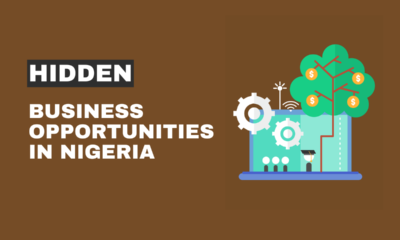BUSINESS
Top 10 Best Cities To Start A Business In Nigeria
Published
2 months agoon

Discovering the best cities to start a business in Nigeria requires careful consideration of the country’s unique advantages. Nigeria’s massive population of over 225 million people creates an expansive consumer market, while its position as one of Africa’s fastest-growing economies generates diverse business opportunities.
The country’s abundant natural resources fuel various industries, from oil and gas to minerals and agriculture, making many cities attractive for entrepreneurs. Government initiatives actively support new businesses through targeted programs and incentives, creating a more conducive environment for startups.
When evaluating the best cities to start a business in Nigeria, entrepreneurs must consider crucial factors like population density, economic vibrancy, infrastructure quality, and living costs. Each city offers distinct advantages, from established commercial hubs to emerging markets with untapped potential.
Our comprehensive analysis of the best cities to start a business in Nigeria examines key metrics including market access, workforce availability, and business support systems. These insights help entrepreneurs identify optimal locations for their ventures.
We’ve thoroughly assessed multiple urban centres to identify the best cities to start a business in Nigeria, ranking the top 10 locations based on current market conditions and growth potential. This detailed evaluation will guide you in selecting the ideal city for your business venture.
Now, let’s explore these top 10 best cities to start a business in Nigeria…
Here’s a detailed exploration of the best cities to start a business in Nigeria:
1. Lagos
Lagos stands as Nigeria’s pulsating economic powerhouse, drawing entrepreneurs with its massive consumer market of over 20 million people. International corporations, from Google to Microsoft, have chosen Lagos as their Nigerian headquarters, creating a thriving ecosystem for startups.
The city’s diverse talent pool, spanning technology, finance, and creative industries, provides businesses with skilled workforce access. While operating costs run higher than other cities, Lagos’s robust infrastructure and established business networks offer unparalleled growth opportunities.
Entrepreneurs must develop comprehensive business strategies to navigate the competitive landscape effectively.
2. Abuja
As Nigeria’s carefully planned capital city, Abuja attracts substantial government and private sector investments. The city’s modern infrastructure, political stability, and growing middle-class population create ideal conditions for businesses targeting government contracts or high-end consumers.
International organizations and diplomatic missions contribute to a sophisticated market for premium services and products. Abuja’s central location makes it one of the best cities to start a business in Nigeria, particularly for companies seeking nationwide distribution capabilities.
3. Ibadan
Ibadan combines historical significance with modern business opportunities, housing over 6 million residents. The city’s lower operational costs compared to Lagos make it attractive for manufacturing and agriculture ventures.
Multiple universities, including the University of Ibadan, create a steady demand for student-focused businesses. The city’s improving infrastructure and proximity to Lagos position it perfectly for businesses seeking cost-effective operations while maintaining access to major markets.
4. Kano
As northern Nigeria’s commercial hub, Kano serves as a gateway to markets across the Sahel region. The city’s ancient trading heritage continues today through its massive markets and industrial zones.
Manufacturing businesses benefit from lower labour costs and established distribution networks reaching into neighbouring countries. Kano’s agricultural processing sector offers particular promise for entrepreneurs in food processing and distribution.
5. Rivers
Port Harcourt drives Nigeria’s oil and gas sector, creating numerous opportunities in support services. The city’s deep-water port facilitates international trade, while its energy sector attracts substantial foreign investment.
Businesses in logistics, engineering, and environmental services find fertile ground here. The city’s growing middle class also supports retail and service sector expansion.
6. Onitsha
Known as one of the best cities to start a business in Nigeria for trade, Onitsha hosts West Africa’s largest market. The city’s strategic location on the Niger River enables efficient distribution across Nigeria’s eastern region.
Entrepreneurs can tap into established trading networks and benefit from the city’s experienced merchant community. The manufacturing sector, particularly in consumer goods, continues to grow rapidly.
7. Aba
Aba’s reputation as Nigeria’s manufacturing powerhouse stems from its skilled artisan community and entrepreneurial spirit. The city specializes in leather works, garments, and consumer goods production.
Local manufacturers export products across West Africa, benefiting from well-established distribution networks. The city’s lower operating costs attract businesses seeking manufacturing bases.
8. Benin City
Benin City’s rich cultural heritage meets modern business opportunities. The city’s strategic location between Lagos and Port Harcourt creates excellent distribution advantages.
Growing industries include agriculture processing, education, and technology services. The city’s young population provides a ready workforce and consumer market.
9. Warri
Warri’s business landscape is defined by energy sector dominance, which creates opportunities in related services. The city’s port facilities support international trade, while its industrial zones attract manufacturing investments. Engineering, environmental services, and logistics businesses find particularly favourable conditions here.
10. Jos
Jos’s temperate climate and rich agricultural land create unique business opportunities. The city ranks among the best cities to start a business in Nigeria, particularly in the agriculture and tourism sectors. Its mining heritage provides opportunities in mineral processing and export.
The growing tourism sector supports hospitality and service businesses, while the agricultural sector offers potential in food processing and distribution.
When selecting your ideal location, consider factors beyond basic infrastructure – examine market access, workforce availability, competitive landscape, and sector-specific advantages. Each city has unique benefits and challenges, requiring careful evaluation of your business model and long-term objectives.
For more articles on business, check here.
You may like
-


5 Success Tips For Start-Up Businesses In Nigeria
-


5 Myths About The Job Market And Their Solutions
-


Master The Art Of Budgeting In Business With These 5 Tips
-


Top 7 Hidden Business Opportunities In Nigeria
-


7 Most Profitable Business Ideas In Nigeria
-


Telecom Entrepreneurs Raise Concerns Over Borrow-Me-Credit Scheme
BUSINESS
5 Success Tips For Start-Up Businesses In Nigeria
Published
2 weeks agoon
December 23, 2024
Nigeria’s entrepreneurial landscape is vibrant yet demanding, and success tips for start-up businesses in Nigeria are essential for navigating its challenges.
Achieving business success requires a combination of strategic planning, resilience, and a clear understanding of the market.
For start-ups, mastering these success tips for start-up businesses in Nigeria can help transform obstacles into opportunities and turn ideas into thriving ventures.
By adopting the right strategies, entrepreneurs can effectively launch and scale their businesses in Nigeria’s competitive environment.
These success tips for start-up businesses in Nigeria offer crucial insights into overcoming challenges, seizing opportunities, and building sustainable growth.
1. Develop a Robust Business Plan
Crafting a comprehensive business plan is fundamental for start-ups in Nigeria. Successful entrepreneurs recognise that a well-structured plan serves as a roadmap for growth. Your business strategy should include:
- Detailed market research
- Clear financial projections
- Competitive analysis
- Realistic operational strategies
Success tips for business always emphasise the importance of thorough planning. Nigerian start-ups must create flexible plans that can adapt to the dynamic economic environment.
2. Leverage Technology and Digital Platforms
Digital transformation is crucial for modern start-ups in Nigeria. Embracing technological solutions can significantly enhance business efficiency and market reach. Success tips for business in the digital age include:
- Utilising cloud computing
- Implementing robust cybersecurity measures
- Exploring e-commerce platforms
- Developing mobile-friendly interfaces
Start-ups in Nigeria must invest in technological infrastructure to remain competitive and innovative.
3. Build a Strong Network and Partnerships
Networking is a critical success tip for business growth in Nigeria. Building strategic relationships can open doors to opportunities, funding, and mentorship. Entrepreneurs should:
- Attend industry conferences
- Join professional associations
- Engage with local and international business communities
- Seek mentorship from experienced entrepreneurs
Successful start-ups in Nigeria understand that connections are as valuable as capital.
4. Secure Adequate Funding and Financial Management
Financial stability is paramount for start-ups in Nigeria. Success tips for business include:
- Exploring multiple funding sources
- Maintaining transparent financial records
- Understanding government grants and initiatives
- Developing sound financial management strategies
Nigerian entrepreneurs must be creative in securing and managing their financial resources.
5. Prioritise Customer Experience and Market Adaptation
Customer-centric approaches distinguish successful start-ups in Nigeria. Entrepreneurs should:
- Conduct regular market research
- Gather and implement customer feedback
- Stay agile and responsive to market changes
- Develop unique value propositions
Success tips for business always highlight the importance of understanding and serving customer needs effectively.
Additional Considerations for Nigerian Start-ups
Beyond these core strategies, start-ups in Nigeria must also:
- Navigate regulatory environments
- Understand local business cultures
- Develop resilience against economic fluctuations
- Continuously learn and upgrade skills
Conclusion
Success tips for business are not one-size-fits-all solutions. Start-ups in Nigeria must combine strategic planning, technological innovation, strong networks, financial acumen, and customer focus to thrive.
By implementing these strategies, Nigerian entrepreneurs can transform challenges into opportunities and build sustainable, successful businesses in an increasingly competitive global marketplace.
If you found this article helpful, continue reading here.

Myths about the job market can mislead job seekers and professionals navigating career transitions. Many individuals fall prey to outdated beliefs that no longer reflect the dynamic employment landscape.
Myths about the job market often include misconceptions about required qualifications, salary expectations, and career progression.
One prevalent myth suggests that a traditional four-year degree guarantees immediate employment when in reality, skills, adaptability, and networking play crucial roles.
Another widespread misconception is that changing careers is impossible after a certain age, which undermines the potential of experienced professionals seeking transformation.
Myths about the job market also perpetuate the idea that stability means staying in one role for decades. Modern career paths are increasingly non-linear, with professionals expecting to change jobs multiple times.
The solution lies in continuous learning, developing transferable skills, embracing technological advancements, and maintaining a flexible, growth-orientated mindset.
Myths about the job market can be debunked through proactive research, upskilling, and understanding emerging industry trends.
Let’s take a quick look at these myths and how to solve them below.
Myth 1: You Need a Four-Year Degree to Succeed
While a college degree can open doors, it’s not the only path to a fulfilling career. Many successful professionals have built thriving careers without a traditional degree.
Solution:
- Skill-Based Learning: Focus on developing in-demand skills through online courses, boot camps, or certifications.
- Networking: Build relationships with professionals in your desired field, regardless of their educational background.
- Freelancing and Gig Work: Gain experience and build a portfolio through freelance projects.
Myth 2: The Job Market is Saturated
It’s true that competition can be fierce, but there are still plenty of opportunities for skilled individuals. The key is to identify niche markets and unique value propositions.
Solution:
- Niche Down: Specialise in a specific area within your industry to stand out from the crowd.
- Continuous Learning: Stay updated on industry trends and emerging technologies to remain competitive.
- Personal Branding: Build a strong personal brand to attract potential employers and clients.
Myth 3: You Should Only Apply to Job Postings
While applying to job postings is a traditional approach, it’s not the only way to land a job. Proactive job hunting can yield better results.
Solution:
- Networking: Connect with people in your industry and let them know you’re looking for opportunities.
- Informational Interviews: Schedule informational interviews to learn about potential job openings and company culture.
- Cold Emailing: Reach out to hiring managers directly to express your interest in a position.
Myth 4: You Should Stay in a Job You Hate
Staying in a job you despise can negatively impact your mental health and career progression. It’s essential to prioritise your well-being and seek new opportunities.
Solution:
- Set Career Goals: Define your long-term career aspirations and create a plan to achieve them.
- Upskill and Reskill: Invest in your professional development to enhance your job prospects.
- Network Strategically: Build relationships with people who can help you find new opportunities.
Myth 5: The Job Market is Only for Young People
Age discrimination is a real issue, but it doesn’t mean older workers can’t find fulfilling careers. Experience and wisdom are valuable assets in the job market.
Solution:
- Highlight Your Experience: Emphasise your skills and accomplishments, focusing on how they can benefit your potential employer.
- Adapt to Change: Stay updated on technological advancements and industry trends.
- Mentor Younger Professionals: Sharing your knowledge and experience can boost your credibility and open doors to new opportunities.
Remember, the job market is constantly evolving. By debunking these myths and taking proactive steps, you can increase your chances of finding a fulfilling career.
So, don’t let these misconceptions hold you back. Keep learning, keep networking, and keep believing in yourself.
Key takeaways:
- Myths about the job market can hinder your job search.
- A four-year degree is not always necessary to succeed.
- Skill-based learning and networking can help you land a job.
- The job market is not saturated, but you need to niche down and continuously learn.
- Applying to job postings is not the only way to find a job.
- You should not stay in a job you hate.
- The job market is not only for young people.
- Older workers can still find fulfilling careers by highlighting their experience and adapting to change.
By understanding these myths and implementing the suggested solutions, you can empower yourself to navigate the job market with confidence and achieve your career goals.
Check out more updates here.
BUSINESS
Master The Art Of Budgeting In Business With These 5 Tips
Published
1 month agoon
December 2, 2024
Effective budgeting in business is crucial for success. It ensures financial stability and drives strategic growth. Whether you’re a small startup or an established company, proper budgeting in business helps control costs and maximize profits.
Here are five essential tips to master the art of budgeting in business.
1. Set Clear Financial Goals
Every successful budget starts with clear goals. Define what you want to achieve financially. Are you aiming to reduce costs, increase revenue, or expand operations?
Set specific, measurable, and realistic targets. This step provides direction and helps prioritize spending.
Align goals with strategy:
Ensure your financial goals align with your overall business strategy. For instance, if growth is a priority, allocate more resources to marketing and product development.
Budgeting in business becomes more effective when tied to clear objectives.
2. Track and Analyse Expenses
Understanding where your money goes is vital. Track all expenses, no matter how small. Categorise them into fixed (rent, salaries) and variable (utilities, supplies) costs.
Use accounting software to automate this process and reduce human error.
Review regularly:
Analyse your spending patterns monthly or quarterly. Identify areas where you can cut costs or optimise spending. Regular expense tracking ensures your budgeting in business stays accurate and adaptable.
Pro Tip:
Use historical data to forecast future expenses. This helps you prepare for seasonal fluctuations or unexpected costs. Knowing your spending trends enhances control over your finances.
3. Create a Realistic Cash Flow Forecast
Cash flow is the lifeblood of any business. A realistic forecast shows when money will enter and leave your business.
Include all income sources and expected expenses. This prediction helps you anticipate shortfalls and plan accordingly.
Why it matters:
A solid cash flow forecast prevents financial surprises. It ensures you have enough liquidity to cover day-to-day operations. Effective budgeting in business relies heavily on accurate cash flow management.
Example:
If you know a major expense is coming in a particular month, you can adjust spending in other areas. This proactive approach avoids cash shortages and keeps operations smooth.
4. Prioritise Essential Spending
Not all expenses are created equal. Identify which costs are essential for business operations and which are not.
Focus on spending that drives growth or maintains critical functions. Cut or postpone non-essential expenses during tight periods.
Evaluate ROI:
Assess the return on investment (ROI) for each expense. Prioritise high-ROI activities like marketing campaigns that generate leads or equipment upgrades that boost efficiency.
Budgeting in business becomes more impactful when resources are allocated wisely.
Key Areas to Prioritise:
- Payroll and essential staffing
- Marketing efforts with proven results
- Product development
- Maintenance of critical infrastructure
5. Monitor and Adjust Your Budget Regularly
A budget isn’t static; it’s a dynamic tool. Regular monitoring and adjustments are crucial. Compare actual performance against your budgeted figures.
Identify discrepancies and adjust as needed. This flexibility helps you respond to unexpected challenges or opportunities.
Stay proactive:
Review your budget monthly. If you’re consistently overspending in a certain area, investigate why. Maybe costs have increased, or perhaps there’s inefficiency.
Adjust your budget to reflect these changes. Continuous monitoring makes budgeting in business more resilient and accurate.
Use technology:
Leverage budgeting software to streamline this process. Many tools provide real-time updates and automated reports. This technology helps you make data-driven decisions quickly.
The Importance of Budgeting in Business
Effective budgeting ensures you allocate resources efficiently. It minimises financial risks and maximises profitability. Without a budget, businesses can easily overspend or miss opportunities.
Proper budgeting in business helps set clear financial priorities and keeps operations running smoothly.
Key Benefits:
- Financial Control: Keeps track of income and expenses.
- Strategic Planning: Aligns spending with business goals.
- Risk Management: Prepares for unexpected challenges.
- Performance Measurement: Helps assess financial health and progress.
Common Budgeting Mistakes to Avoid
Mastering budgeting requires avoiding common pitfalls. Here are a few mistakes to watch out for:
- Underestimating Costs: Always factor in potential price increases or hidden fees.
- Ignoring Cash Flow: Profit isn’t the same as cash flow. Ensure you have enough liquid assets.
- Overestimating Revenue: Be conservative with income forecasts. Unrealistic expectations can lead to shortfalls.
- Failing to Involve Teams: Include department heads in the budgeting process. They offer valuable insights and ensure buy-in.
Avoiding these mistakes strengthens your approach to budgeting in business and improves financial outcomes.
Implementing Budgeting Tools
Technology simplifies the budgeting process. Numerous tools help businesses create, track, and adjust budgets. Look for software that integrates with your accounting system. This integration saves time and ensures accuracy.
Top Features to Look For:
- Real-time expense tracking
- Customisable reports
- Forecasting capabilities
- Multi-user access for collaboration
Implementing these tools streamlines your budgeting in business and enhances decision-making.
Conclusion:
Mastering the art of budgeting in business isn’t just about numbers. It’s about setting clear goals, tracking expenses, forecasting cash flow, and continuously adjusting.
These five tips will help you build a strong, flexible budget that drives success. Stay proactive, use technology, and prioritize essential spending.
With effective budgeting, your business will thrive financially and strategically.
If you found this article helpful, consider reading more here.
Latest


NBA Roundup: Giannis Triple-Double Leads Milwaukee Bucks To Win Over Toronto Raptors
Giannis Antetokounmpo (30) recorded his fourth triple-double of the season, contributing 11 points, 12 rebounds, and a season-high 13 assists....


Ben Affleck & Jennifer Lopez Officially Finalise Divorce Settlement 2 Years After Marriage
Jennifer Lopez and Ben Affleck will finalise their divorce on February 20, 2025, following a mutual agreement confirmed in court...


Rapper Ice Prince’s Baby Mama Calls Him Out For Neglecting Their Son
Nigerian rapper Panshak Zamani, widely known as Ice Prince, has been publicly accused of gross negligence towards the health and...


Emerse Fae Insists Simon Adingra Must “Work Hard” To Emulate Drogba In Premier League
Emerse Fae, the 40-year-old coach of Cote d’Ivoire, has provided a roadmap for Simon Adingra to fulfil his extraordinary potential...


Actor Yul Edochie’s Wife, Judy Austin Celebrates His Birthday
Judy Austin, the second wife of Nollywood actor Yul Edochie, shared a moving tribute to her husband on Instagram as...


Double Olympic Champion Beatrice Chebet Caps Stellar 2024 With Women’s 5km World Record
Beatrice Chebet, the 24-year-old Kenyan runner, shattered the women’s 5 km world record at Tuesday’s Barcelona’s Cursa dels Nassos road...


Cobhams Asuquo’s Birthday Look Exudes Cinematic Vibe
Acclaimed Nigerian musician, producer, and songwriter Cobhams Asuquo has marked his 44th birthday with a striking professional photoshoot that showcases...


Speed Darlington’s ₦300m Rights Suit Against I-G Set For Hearing January 13
On December 23, 2024, Justice Liman issued an order directing the Inspector-General of Police (I-G), Kayode Egbetokun, to charge Speed...


10 Meaningful Ways To Reflect On The Year Gone By
As 2025 draws closer and another year comes to a close, take a moment to reflect on the events and...


Paul Okoye And Wife Ifeoma Dedicate Baby Girl At Church
Paul Okoye and his wife Ifeoma celebrated the birth of their daughter, Imani, by dedicating her in their church. On...
-Ad-




Here Are The Most Streamed Gospel Artists On Spotify Africa

Davido Announces New Album “5ive” Set To Drop In 2025

Burna Boy Set To Release New Single, “Bundle” This December

“Everybody Loves Jenifa” Sells Out Ahead Of UK Premiere On December 20

Discover The 4 Fun Places To Visit In Kaduna

Funke Akindele’s “Everybody Loves Jenifa” Breaks Box-Office Records With ₦206 Million In Its Opening Weekend

NNPC Slashes Petrol Prices Nationwide

Davido Unveils Cinematic Video Of “Funds” Featuring Chike & OdumoduBlvck

How To Style A Jean Jacket According To Denim Experts

Shallipopi Confirms Split With Dapper Music, Accuses The Label Of Breach Of Trust
Trending
-

 ENTERTAINMENT1 day ago
ENTERTAINMENT1 day agoPaul Okoye And Wife Ifeoma Dedicate Baby Girl At Church
-

 NEWS1 day ago
NEWS1 day agoSpeed Darlington’s ₦300m Rights Suit Against I-G Set For Hearing January 13
-

 FASHION24 hours ago
FASHION24 hours agoCobhams Asuquo’s Birthday Look Exudes Cinematic Vibe
-

 LIFESTYLE1 day ago
LIFESTYLE1 day ago10 Meaningful Ways To Reflect On The Year Gone By
-

 SPORTS5 hours ago
SPORTS5 hours agoDouble Olympic Champion Beatrice Chebet Caps Stellar 2024 With Women’s 5km World Record
-

 ENTERTAINMENT5 hours ago
ENTERTAINMENT5 hours agoActor Yul Edochie’s Wife, Judy Austin Celebrates His Birthday
-

 SPORTS4 hours ago
SPORTS4 hours agoEmerse Fae Insists Simon Adingra Must “Work Hard” To Emulate Drogba In Premier League
-

 ENTERTAINMENT4 hours ago
ENTERTAINMENT4 hours agoRapper Ice Prince’s Baby Mama Calls Him Out For Neglecting Their Son

